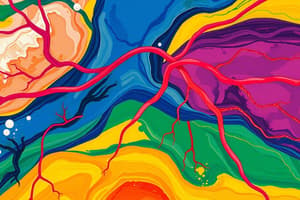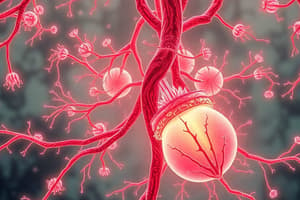Podcast
Questions and Answers
What is the main function of the lymphatic system?
What is the main function of the lymphatic system?
- Generate red blood cells
- Transport escaped fluids back to the blood (correct)
- Transport nutrients to tissues
- Aid in hormone regulation
What characterizes lymph?
What characterizes lymph?
- It contains high levels of red blood cells
- It is dense and colored
- It is similar to plasma proteins (correct)
- It is a waste product of digestion
What effect do lymphocytes have in the body?
What effect do lymphocytes have in the body?
- Transport oxygen
- Decrease blood pressure
- Produce energy
- Eliminate pathogens (correct)
What is the primary function of valves in the lymphatic system?
What is the primary function of valves in the lymphatic system?
What are the mini-valves in lymphatic capillaries responsible for?
What are the mini-valves in lymphatic capillaries responsible for?
Which layer of the lymphatic vessels is responsible for contraction?
Which layer of the lymphatic vessels is responsible for contraction?
Which duct collects lymph from the right side of the body?
Which duct collects lymph from the right side of the body?
What role does the thoracic duct play in the lymphatic system?
What role does the thoracic duct play in the lymphatic system?
How do skeletal muscles contribute to lymph transport?
How do skeletal muscles contribute to lymph transport?
How does the lymphatic system help maintain blood pressure?
How does the lymphatic system help maintain blood pressure?
What are lymph nodes primarily responsible for?
What are lymph nodes primarily responsible for?
What is the defining characteristic of the lymphatic vessels system?
What is the defining characteristic of the lymphatic vessels system?
Which component of lymph nodes helps in the differentiation of B cells into plasma cells?
Which component of lymph nodes helps in the differentiation of B cells into plasma cells?
What is the primary composition of lymph nodes?
What is the primary composition of lymph nodes?
What triggers the movement of lymph during breathing?
What triggers the movement of lymph during breathing?
Which of the following best describes lymphatic capillaries?
Which of the following best describes lymphatic capillaries?
Flashcards
Lymph function
Lymph function
Transports fluids back to blood, defends against diseases
Lymph composition
Lymph composition
Clear fluid similar to plasma, contains pathogens
Lymphatic capillaries
Lymphatic capillaries
Smallest lymphatic vessels, absorb tissue fluid
Lymphatic vessel function
Lymphatic vessel function
Signup and view all the flashcards
Lymph nodes function
Lymph nodes function
Signup and view all the flashcards
Edema
Edema
Signup and view all the flashcards
Right lymphatic duct
Right lymphatic duct
Signup and view all the flashcards
Thoracic duct
Thoracic duct
Signup and view all the flashcards
What prevents backflow in lymphatic vessels?
What prevents backflow in lymphatic vessels?
Signup and view all the flashcards
What are the three layers of larger lymphatic vessels?
What are the three layers of larger lymphatic vessels?
Signup and view all the flashcards
How does lymph flow?
How does lymph flow?
Signup and view all the flashcards
What are lymph nodes?
What are lymph nodes?
Signup and view all the flashcards
What types of cells are found in lymph nodes?
What types of cells are found in lymph nodes?
Signup and view all the flashcards
What does the lymph node's cortex contain?
What does the lymph node's cortex contain?
Signup and view all the flashcards
What does the lymph node's medulla contain?
What does the lymph node's medulla contain?
Signup and view all the flashcards
What is the flow of lymph through the lymphatic system?
What is the flow of lymph through the lymphatic system?
Signup and view all the flashcards
Study Notes
Lymphatic System Overview
- Function: Transports fluid back to cardiovascular system; defends against disease.
- Lymph: Clear, colorless fluid similar to plasma; contains extracellular fluid, potentially pathogens.
- Edema: Accumulation of excess fluid in tissues.
Lymphatic Vessels
- Lymphatic capillaries: Smallest vessels; have mini-valves allowing fluid entry but preventing backflow.
- Terminal lymphatics: Anchored to connective tissues, maintain blood pressure and volume.
- Lymphatic collecting vessels: Collect lymph from capillaries, carry to lymph nodes.
- Lymphatic ducts: Transport lymph to veins.
- Right lymphatic duct: Drains right arm, head, and thorax to right subclavian vein.
- Thoracic duct: Drains rest of the body to left subclavian vein; larger and longer, receives more lymph.
- Lymphatic vessel structure: Thin-walled, three layers (tunica interna, media, externa); valves prevent backflow.
- Lymphatic flow: Low-pressure, slow-speed flow; driven by rhythmic contractions of vessels, skeletal muscle action, and respiration.
Lymph Nodes
- Location: Kidney-shaped, embedded in connective tissues; numerous (at least 450 in adults).
- Structure: Cortex (outer, contains lymphocytes; swells with pathogen presence) and medulla (inner, contains macrophages).
- Function: Filter lymph, removing bacteria, viruses, cancer cells, and debris. Lymph nodes contain immune cells to kill pathogens and produce antibodies.
- Immune cells: Natural killer cells, macrophages, lymphocytes.
Lymphoid Tissues
- Function: Contain lymphocytes (immune cells) that kill pathogens and produce antibodies.
Studying That Suits You
Use AI to generate personalized quizzes and flashcards to suit your learning preferences.




